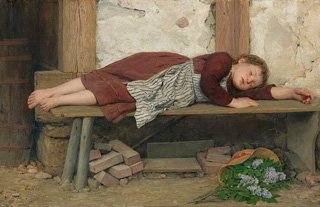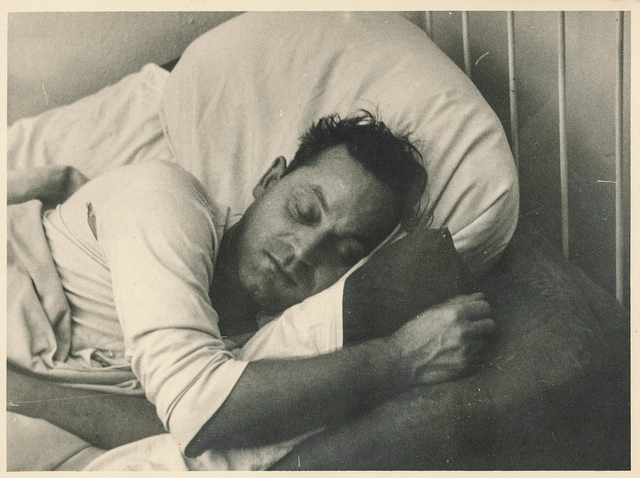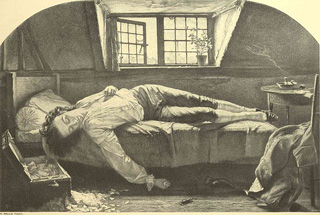Better Sleeping: One Long Sleep, or Two Shorter Periods?
Some people can't sleep. That's called insomnia. But maybe you have trouble sleeping all night and wake up at times. It appears that 2/3 of people experience some form of trouble sleeping that disturbs the quality of their sleep.

Source, Rebecca Pollard, CC BY 2.0
Our current sleep periods could be a recent development, with the norm formally being that we had 2 sleep periods separated by a brief state of wakefulness. There are medical texts, court records and diaries containing numerous accounts of segmented sleep, referencing both a first and second period of sleep in a day.
Vestiges of this former standard in sleep behavior can be hinted at as recently as 1840 in Charles Dickens' novel Barnaby Rudge. There is a passage that reads:
He knew this, even in the horror with which he started from his first sleep, and threw up the window to dispel it by the presence of some object, beyond the room, which had not been, as it were, the witness of his dream.
Having two sleep periods instead of one is called bi-modal sleeping. Evidence of this norm goes beyond literature or other texts, as anthropologists have found evidence in preindustrial Europe that bi-modal sleeping was an established norm. This is uncovered in the book At Day's Close: Night in Times Past by historian Roger Ekirch. He says that people slept a few of hours after the sun went down, then woke up for 1 to 2 hours, then went back to sleep until morning. Apparently, people would either relax, think about their dreams, have sex, sew, chop wood, or read under the light of a lamp or the moon.
This pattern of sleep started to disappear its 17th century in the upper classes of northern Europe which then expanded to the rest of Western society over the next 200 years. This coincides with the appearance of insomnia in literature of the late 19th century. We are now told that we need to get continuous amount of sleep each night or else we're going to have problems in the short term with their ability to think, or problems with our health. Maybe people who have trouble doing so can opt-out for the old bi-model sleeping pattern.
There are still cultures who engage in two-part sleep phases, such as those taking an afternoon siesta. The post-lunch dip is recognized as a part of the day where our biological blocks have a reduction in alertness, welcoming a respite in the form of a nap. An experiment by Thomas Wehr in 1992 showed that people developed a two-phase sleep pattern after being left in darkness for 14 hours each day. They slept for 4 hours, then woke up for 1-3 hours, and slept another hour hours afterwards. That makes 8 hours total sleep, but split up, much like the bi-modal accounts from history may have been done.
Society has changed. As it once may have been possible to engage in these sleep/wake cycles, our* modern demanding schedules* don't align well with that mentality anymore. Our current recommended 7 to 9 hours of continuous uninterrupted sleep might not be best suited for circadian rhythms of synchronizing with the 24-hour light and dark cycles.
Pulling off the bimodal sleep pattern means to go to sleep when there is a strong drive to do so at a low circadian point so we fall asleep quickly. Advantages include more time with family, increased activity, creativity and alertness across the day, as opposed to long periods of wakefulness where sleepiness increases and our productivity decreases. Even if one doesn't do this, naps have a positive impact for memory and learning, increasing our alertness and improving our moods. Splitting up sleep into periods seems to be advantageous.
Those who work the night shift, have increased risks to their health in the form of chronic diseases like obesity, type II diabetes and heart disease. Some employers have addressed these problems of prolonged wakefulness and circadian misalignment by shifting the amount of wakefulness endured by night workers. Employees work multiple short shifts composed of multiple work/rest cycles that are separated by off-duty periods every 24 hours.
Sustaining alertness for 12 hours shifts can have safety implications, apart form fatigue and reduced productivity. By creating more adequate sleep routines, employers can get more productivity from their employees and ensure they remain healthy as well. Even if the burden of the night shift can't be eliminated, at least people can get better sleep in through splitting their work schedules and sleep patterns, and avoid the need for more than 6-8 hours of sustained alertness.
Adopting the pre-industrial sleep pasterns of our ancestors can potentially work in a our modern times. We just need to try it out and see if it does work better for us. Not everyone can handle the consolidated sleep requirement imposed upon us, and this pressure can create anxiety that further diminishes the amount of solid sleep we get. Sleeping for shorter periods with a break in between can be a better alternative for many people.
How do you sleep? Have you tried sleeping in two shorter periods rather than one whole longer period?
Thank you for your time and attention. Peace.
References:
- The myth of the eight-hour sleep
- Your Ancestors Didn’t Sleep Like You
- Did we used to have two sleeps rather than one? Should we again?
- Humans Used to Sleep in Two Shifts, And Maybe We Should Do It Again
- David R Hillman and Leon C Lack. Public health implications of sleep loss: the community burden; Med J Aust 2013. 199 (8 Suppl): S7-S10. || doi: 10.5694/mja13.10620
- THOMAS A. WEHR. In short photoperiods, human sleep is biphasic. doi: 10.1111/j.1365-2869.1992.tb00019.x
- GianlucaFiccaaJohnAxelssonbDaniel J.MolliconecVincenzoMutoaMichael V.Vitiellod. Naps, cognition and performance. doi: 10.1016/j.smrv.2009.09.005
If you appreciate and value the content, please consider: Upvoting, Sharing or Reblogging below.
 me for more content to come!
me for more content to come!
My goal is to share knowledge, truth and moral understanding in order to help change the world for the better. If you appreciate and value what I do, please consider supporting me as a Steem Witness by voting for me at the bottom of the Witness page; or just click on the upvote button if I am in the top 50.



.jpg)

Thanks for this well written post on an interesting topic. I am going to try this bimodal sleep you spoke of. I had often thought of trying to adopt the Di'Vinci sleep cycle that Kramer tried in Seinfeld. I probably never did it for fear of ending up in the Hudson River like Kramer did. I feel like the bimodal sleep schedule will be easier to get used to. Thanks again for this information.
You're welcome. I hope it works out well for you ;)
As a kid we were encouraged to take short naps in the afternoon and this was a habit that I had until college where I would have shorter night sleeps because of studying but would take power naps after lunch to have energy and attentiveness during the 2nd half of the day.
When I entered the workforce unfortunately this changed and napping was something frowned on as it was associated to being lazy even if your lunch period is not paid.
You had to go to work early and it was unheard to go home before the bosses or else be branded as a slacker.
My performance and creativity dropped and so I made sure that I eat fast and take power naps as needed and not care about being talked about because I needed the extra energy just to slog through the BS.
Yeah, I enjoy a nap now and then, now that I;m not working. There is often a drowsy period after eating ;) Naps are good to recharge
A friend from many years ago slept 4 x 30 minutes a day for years and performed well. It took training to get to that though.
I remember reading of a study done with insomniacs where they went for a week out into the desert camping and had no unnatural light and supposedly it reset their circadian cycle.
Damn, that's awesome. 2 hours sleep, 22 hours of productivity potential :D
That would be a good cure for insomniacs, because many end up on pills :/
An American guy in Papua New Guinea (travelled to Aus a lot which is where I met him), worked a full-time job for a company there and then a full-time job in the States online. He was studying via correspondence, well read and still had time to go to the gym.
Yeah, the pills are endless these days. They throw them at people.
Interesting. I've heard of the "two sleeps" before, and it makes sense to me. I'm often tired in the evening after dinner, but have a wave of energy around midnight. Problem is I don't sleep for those couple of hours after dinner, but push through and then don't feel like going to bed until after midnight, not getting enough sleep on a nightly basis.
The Bi-modal pattern of sleep is in play today cos I have alot of that whenever I sleep. When am feeling down, my sleep is split into two and take time to go through some other things before going back to bed
Cool, you already do bi-modal sleeping ;) I take naps now and then, but not bi-modal at night.
Should probably sleep more than I do, but today I sleep once per day and I never have any issue throughout the night or to fall asleep 😁
But just as you write My issue may be that I tend to be to tired cause I just sleep to little and fall asleep everywhere whenever 😅
Hmmm, falling asleep anywhere I think it called narcolepsy :/ I hope you don't have that ;)
Hehe, true. I don't have that, but let's just say that I have no issue falling asleep whenever if I just try.
very interesting information, I work at night, the rest I can not sleep until morning, I do not know when the last dreaming at night, sometimes life becomes chaotic when in the morning must go somewhere.
Due to the nature of my job (Freelance developer) and the heavy insomnia I have suffered in the past; I have had some experiences with Polyphasic sleep and Biphasic sleep. I can honestly, say that there are some real advantages to both in specific circumstances. Very good article.
Cool, glad it has been beneficial to you ;)
I tend to sleep in two periods either both at night or one at night and another during the day. I believe it is the depth or quality of that sleep that heals our and allows us to feel rested. I believe they call it REM sleep. though I do dream and think the more tired you are the less you will dream and the deeper the sleep. Thanks @krnel.
Yeah, I think REM is euqated with deeper sleep and more quality.
How many hours do you sleep a day. or do you sleep 24 hours?